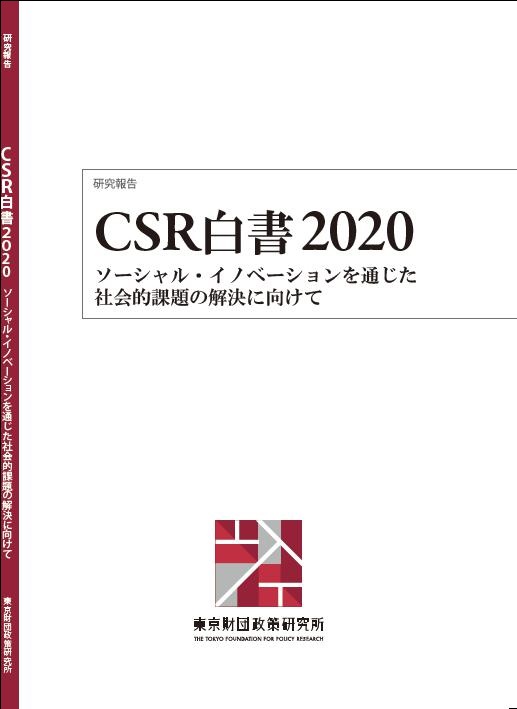
- Article
- Industry, Business, Technology
Social Innovation: Paths to a Sustainable Future
January 20, 2021
Executive Summary of the 2020 CSR White Paper

The 2020 White Paper on Corporate Social Responsibility—“Social Innovation: Paths to a Sustainable Future”—published by the Tokyo Foundation for Policy Research in December 2020, focuses on the role of social innovation in addressing society’s most pressing issues. The Foundation has been issuing a CSR White Paper annually since 2013, offering analyses of questionnaire surveys and interviews with many of the leading companies in the field of CSR, augmented with articles by experts.
Five years have passed since the Sustainable Development Goals (SDGs) were adopted by the United Nations in 2015. Progress toward achieving these goals by 2030 has been slow, though, and stronger action is needed, in particular, to address issues confronting developing countries. Developed countries, for their part, must deal with additional concerns, such as declining birthrates, aging populations, and rural depopulation. These are not new challenges, but existing solutions have proven to be ineffective. This year’s white paper, therefore, highlights the role social innovation can play in charting new “Paths to a Sustainable Future,” shedding light on the innovative ideas and practices businesses are embracing to better meet society’s needs.
A second focus of this year’s white paper is the use of CSR as a tool in attracting and developing human resources. A growing number of young people study the CSR policies and activities of their potential employers when choosing where to send their job applications. The link between CSR and recruitment, though, has received relatively little attention to date, compared to such other CSR-related initiatives as ESG (environment, social, and governance) investing.
Social Innovation
Main Survey Findings
Many businesses appear to be addressing social issues through social innovation, with 83% of respondents saying that they had either “implemented” or “implemented to some extent” innovative initiatives to address social issues.
The higher the number of employees, the likelier the company was to be implementing social innovation. The percentage was also higher for companies whose CSR activities were advanced under direct managerial leadership or a dedicated CSR department. This was true regardless of workforce size.
As for the kind of innovations they had implemented, relatively high shares of respondents noted that they had either worked with other organizations (private businesses, nonprofit and nongovernmental organizations, and government agencies) or had helped resolve society’s challenges through research and development.
The issues most frequently addressed were related to the environment: shifting to renewable energy sources, promoting energy-saving technologies, and introducing CO2 reduction targets. Other major topics included developing pharmaceuticals and implementing work style reforms, such as through the introduction of remote work and childcare support.
Expert Analysis
The aim of social innovation is to redress society’s myriad problems through the private sector’s business activities. Researchers and practitioners alike are calling on companies to address social issues through such initiatives. While pursuing sustainability goals in partnership with outside organizations, businesses also need to enhance their ability to provide products and services that help ameliorate social issues.
Companies need to create value for society, contributing to more sustainable lifestyles and a healthier environment by offering solutions, not adding to the problems. A variety of approaches are ava, from the provision of problem-solving products and innovative processes that reduce society’s burdens to the creation of new networks and communities dedicated to resolving social issues.
Conclusion
Companies where management takes the lead in implementing CSR initiatives tend to have a corporate culture conducive to advancing social innovation. Often, they espouse a corporate philosophy that is closely aligned with CSR ideals and support innovative solutions to address society’s biggest challenges.
CSR and Human Resources
Main Survey Findings
CSR was viewed by many responding companies as an effective tool in their recruitment efforts, with 68% saying they communicate their CSR activities to prospective applicants. They also had high regard for the interest applicants showed in contributing to society, with 67% noting that they rated such interest and actual experience either “very positively” or “positively.”
More than half said that CSR enabled them to hire outstanding candidates, with 57% reporting success in recruiting new graduates and 51% mid-career workers. By workforce size, companies with less than 5,000 employees were less successful in securing coveted human resources, but the success rate rises steeply (for both new graduates and mid-career hires) for businesses with over 5,000 employees.
The percentage that attracted talented workers was higher, moreover, at companies with direct management engagement in CSR initiatives or a department dedicated to CSR. Programs to familiarize employees with CSR were implemented by 65% of responding firms.
Expert Analysis
While interest in CSR among employees is generally on the rise, not all view the topic with the same enthusiasm, and this has been cited as an obstacle to a broader embrace of CSR by many companies. One conventional but nonetheless effective means of heightening awareness is voluntarism, which not only contributes to society but can also open new career paths for the volunteer through exposure to opinions different from one’s own. Volunteering thus offers advantages for the individual, his/her employer, and society at large, echoing the sanpo-yoshi (benefits for three parties) ethic espoused by premodern Japanese merchants. Encouraging all employees to volunteer can be an effective policy from the viewpoint of both human resources development and CSR. This will require removing the unconscious biases of the skeptics and nurturing a workplace environment conducive to volunteering.
Conclusion
The survey results showed that many businesses actively utilize CSR during recruitment, with more than two-thirds having a positive view of applicants with an interest in or experience of contributing to society and over half reporting success in hiring quality workers thanks to their CSR initiatives.
Companies with such human resources are likely to emerge as leaders of social innovation, offering solutions to society’s many challenges through their business activities.
Specific Challenges
Climate Change
The recommendations of the Task Force on Climate-related Financial Disclosure (TCFD) released in June 2017 call for information on climate-related risks and opportunities as part of a company’s financial disclosures, encouraging the use of scenario analysis to evaluate the impact of climate change. Conducting scenario analysis may be a challenge for some companies, but it can help them build management strategies and business plans that are more resilient to contingencies, promoting long-term viability and the creation of new value through technological and other innovations to mitigate climate change.
COVID-19
The number of coronavirus infections per million population and the fatality rate vary greatly from country to country. Figures suggest that deaths increased markedly in countries where a steep rise in cases outpaced their ability to expand healthcare services. This points to the need to upgrade healthcare governance in some countries.
Japan, for instance, experienced governance issues with the initial shortage of COVID-19 test kits. One takeaway from this was the need for communities and businesses to the take the initiative in coordinating their response, instead of simply waiting for instructions from the government.
